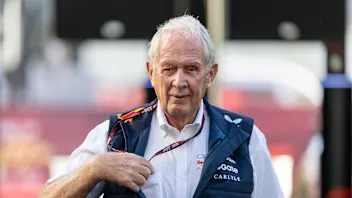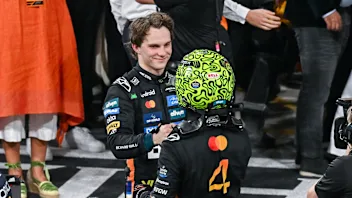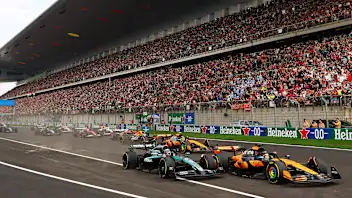At Lotus, Eric Boullier rapidly built himself a reputation as an excellent team principal, turning them into race winners and genuine Red Bull rivals, all on a relatively modest budget. Now he is charged with turning McLaren’s ailing fortunes around.
On paper, his new title is that of ‘racing director’. In reality Boullier says his job is little different, meaning he will be the man charged with calling the shots on the McLaren pit wall come Melbourne.
We caught up with the Frenchman at this week’s Bahrain test to talk about his new life in Woking, his hopes for 2014, his new boss, Ron Dennis, and more…
Q: Eric, the black Lotus livery seemed to be your second skin - and then suddenly you chose another colour from the palette. Can you explain the conversion?
Eric Boullier: I will not talk about that now. There is nothing to be said right now. Or let’s put it this way: it was a rare and great opportunity to join a prestigious team like McLaren. I am delighted and I feel privileged having been contacted.
Q: You were team principal at Lotus, now you are racing director. It’s arguably not such a cool title, but at the end of the day is the job description the same?
EB: It is one hundred percent the same job as with Lotus - it’s just another job title. We have discussed that with Ron (Dennis): the title ‘team principal’ is heritage - something of the past. It was the team founder or the team owner. Today F1 teams are organizations. They have grown massively in the past 30 years. With 19 races and testing I will be away from Woking quite a lot and you cannot run a business if you are away for so long - especially not an F1 team where you have to be on top of every little detail every day if you want to win. The idea is more to split tasks between Jonathan Neale and myself. IT, legal and finance is under Jonathan’s scope, racing and engineering under mine. So at the track I am acting one hundred percent as the team principal. Back at Woking I oversee one part of the organization.
Q: That sounds pretty similar to how Mercedes are running their team, with task sharing between Toto Wolff and Paddy Lowe. Is that the future?
EB: If you look in detail at what happened in my previous team, it was already like that. We’d already split responsibilities. When teams do abolish the team principal title, we have to be modern. (laughs)
Q: You obviously have a way with people - Kimi Raikkonen liked being with Lotus and you ‘reinvented’ Romain Grosjean - but what other talents do you bring to McLaren?
EB: I am very bad at talking about myself. A bit shy. I hope at least to bring the necessary energy to help McLaren get back to the top.
Q: Running a top team on a leaner budget - is that your real secret weapon?
EB: Maybe having that kind of talent is good these days. F1 has changed in the last decade and it might help to have some experience in that ‘leaner’ model which will benefit McLaren.
Q: How much was your decision to join McLaren influenced by the fact they are running a Mercedes engine? Right now it definitely seems you’ve made the right move…
EB: It was only McLaren that made my decision. It was the team that I was watching when I was a kid - the era of Ayrton Senna and Alain Prost. My decision to join McLaren was made before I could even finish saying McLaren!
Q: Was it really that short and spontaneous a decision?
EB: Yes, it was.
Q: Were you still at Lotus you’d be running a Renault engine, which right now seems to be struggling massively. Are you surprised by the extent of that struggle? You must have witnessed Renault’s development process over the course of last year…
EB: In some ways I am surprised, but I won’t comment on this side. Instead I’d say that I am surprised about what Mercedes has achieved: how far they are, how much into details they went.
Q: Renault were one of the spearheads for the 2014 engine changes. Are you surprised by the problems they are having?
EB: With two teams like Red Bull and Lotus as partners in developing this power train - and being the initiator, or rather being in favour of this change - everybody would have expected Renault to be in a better position today.
Q: Ron Dennis is back - one of the great, if sometimes controversial, characters of F1 racing. How is your relationship developing?
EB: So far, very well. Most importantly, you have to reckon that he built what McLaren is - and McLaren helped F1 become what F1 is today. You can only have a huge respect for what he’s achieved. He is a character, true, but that is why the team is what it is today. He is a racer, I am a racer - and there is where it clicks, where it matches.
Q: There is the saying that it is rather difficult to get close to Ron - and that more people haven’t managed it than have…
EB: It is too early to say anything. The ambition is the same and that should be a good basis.
Q: Do you report to Ron?
EB: Yes. And Jonathan. Jonathan is acting as a CEO today, so I also report to him. Jonathan and myself, we complement each other. We work very well together.
Q: You are running a team with one former world champion driver, possibly nearing the end of his career, and one rookie, a rough diamond…
EB: …that reminds me of something! (laughs) Luckily it is good timing - and it reminds me of my ‘previous life’. I think it is good for Jenson (Button) to have somebody who is so hungry next to him. Kevin (Magnussen) and Jenson are getting along very well. Both will benefit from each other and can drive the team upwards.
Q: McLaren are in a transition year engine-wise - switching to Honda next season. Does that make your job more difficult?
EB: No, not at all. We concentrate on this year. And we are very happy with what we have. This is already complicated enough with all these changes - so we speak about the future later. (laughs)
Q: Nothing but success will do. Where do you want to set a course at McLaren and how do you want to remember the year you joined McLaren?
EB: I already have something in my head and it is very clear: I want to win races - at least one race.
Q: So how about the Melbourne race? Some have predicted that less than 50 percent of the cars will finish the race…
EB Well, reliability will be an issue, yes. So probably we will see more cars stopping than seeing the chequered flag.
Q: So what is your gut feeling of what McLaren can achieve - and what do you make of the times that we’ve seen at the various tests?
EB: I think Mercedes will be very strong, but having said that there are some other teams that are not in full bloom in terms of their development yet. Reliability will be key for the first four flyaway races, and from Barcelona onwards we will see the real pecking order come to the fore.
Next Up
Related Articles
 ‘I have achieved my dream, that little boy's dream’ – Norris
‘I have achieved my dream, that little boy's dream’ – Norris 3 inspiring individuals share their paths to working in F1
3 inspiring individuals share their paths to working in F1 Norris collects World Championship trophy at FIA Awards
Norris collects World Championship trophy at FIA Awards Dr Helmut Marko to leave Red Bull motorsport advisor role
Dr Helmut Marko to leave Red Bull motorsport advisor role Piastri 'will be a world champion' in future – Norris
Piastri 'will be a world champion' in future – Norris Tickets on sale for 2026 Chinese Grand Prix
Tickets on sale for 2026 Chinese Grand Prix